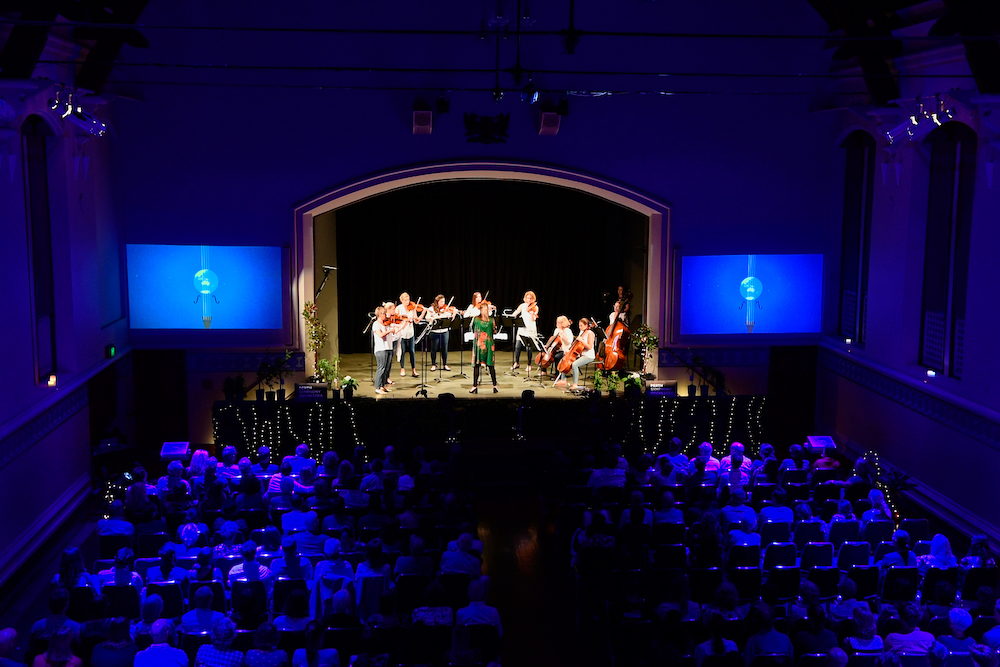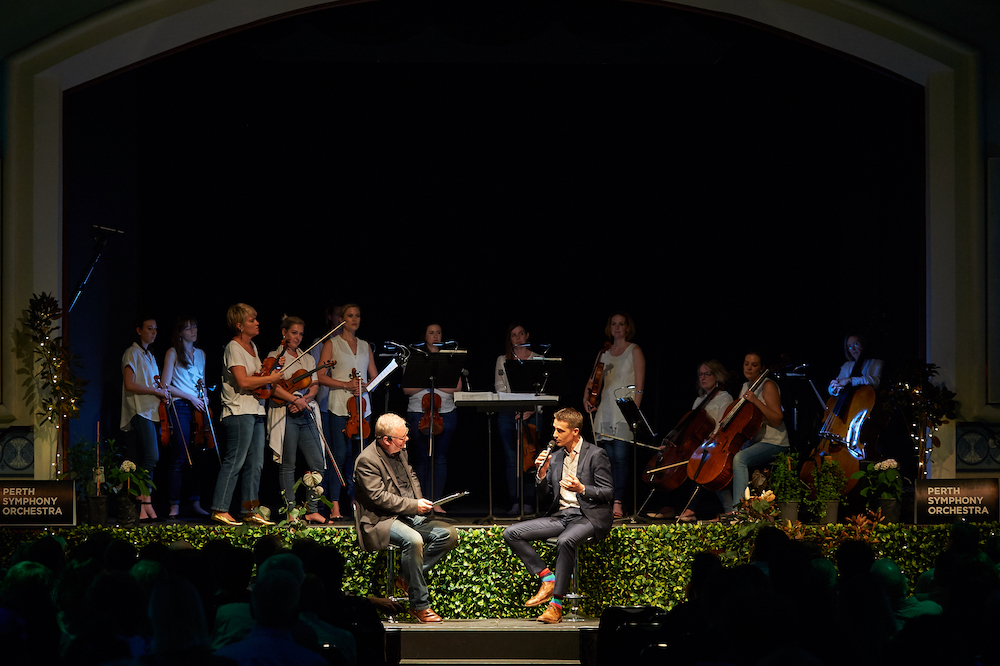The Perth Symphony Orchestra likes to do things differently. In its quest to redefine what it means to be an orchestra in the 21st Century, PSO “rarely sticks to the rules”, instead opting for unconventional repertoire, venues and performance concepts. Their latest project, A Performance for our Planet, was no different. In its bid to celebrate both the Western Australian landscape and the achievements of those working desperately to protect it from environmental ruin, PSO programmed a night of local and international music. Not just a night of music making, this concert saw the musical offerings accompanied by evocative visuals, interspersed with talks from leading environmental experts. It was held in the Perth Town Hall, which was transformed into the WA landscape by a coordinated effort of lighting and sound design.
 Perth Symphony Orchestra’s A Performance for our Planet. Photo © Richard Jefferson
Perth Symphony Orchestra’s A Performance for our Planet. Photo © Richard Jefferson
Needless to say, exploring such a relationship between music and the environment – and of art and science in general – is incredibly ambitious. But the concert’s Producer and Creative Director Bourby Webster, Conductor and Artistic Director Jessica Gethin, and the Perth Chamber Orchestra – PSO’s resident chamber ensemble – were willing to rise to the challenge. For the most part, each of the four ‘chapters’ of the evening (Thriving Oceans, Drought Mitigation, Renewables, and Protecting Biodiversity) were as informative as they were entertaining. Following Harry Fisher’s talk on drought mitigation, the PCO’s performance of WA composer Olivia Davies’ work Crystalline was excellent in its sharp, elemental dryness.
Similarly, PCO’s restrained interpretation of Dvořák’s Nocturne for Strings, with its ceaseless undercurrents and paradoxical weightlessness, complemented both the stunning visuals of windmills and the bite-sized lecture on renewable energy. In a particularly crowd-pleasing moment, the importance of protecting WA’s biodiversity was represented by three pairs of violin soloists, each designated one of three movements (Harvest Song, Mosquito Dance and Bagpipes) from Bartók’s Duos for 2 Violins.
 Perth Symphony Orchestra’s A Performance for our Planet. Photo © Richard Jefferson
Perth Symphony Orchestra’s A Performance for our Planet. Photo © Richard Jefferson
Some musical moments were not as polished, however, owing perhaps to the demands of performing such a range of music in just 75 minutes. Iain Grandage’s The Wild Geese was almost underwhelming, missing rhythmic intensity and the soaring romanticism of its melodic lines, and Stuart Greenbaum’s The Rotation of the Earth was peppered with intonation issues in the higher register that detracted from the stunning landscape visuals that accompanied the work. But the soloists were endlessly engaging; guitarist Rick Webster presented John Butler’s Ocean with the conviction and skill of an entire guitar ensemble, and Sophie Curtis’s performance of Ross Edwards‘ Water Spirit Song was equal parts haunting and mesmerising.
Opening the concert, it was this performance of Water Spirit Song that had the most emotional impact in lamenting the state of our planet, and came closest to really examining the responsibility that we all share in today’s precarious environmental situation. Images of bleached coral and destruction of underwater habitats transformed the Edwards’ music into a requiem for our oceans, forcing the audience to contemplate the fragility of our underwater ecosystems, and how our own actions can impact the world around us. Had more of the music functioned in this way as a reflective artistic tool, rather than illustrating and representing the environmental concepts discussed beforehand at face value, A Performance for our Planet could have been a much more thought-provoking exercise. In this way, the relationship between scientific research and artistic expression could have been explored as something dynamic, and as vital to our endeavours as members of society trying to sustain our planet. Should PSO restage this concert in their next season (and I really hope they do), I believe they can promote their messages with even more force.











Comments
Log in to join the conversation.